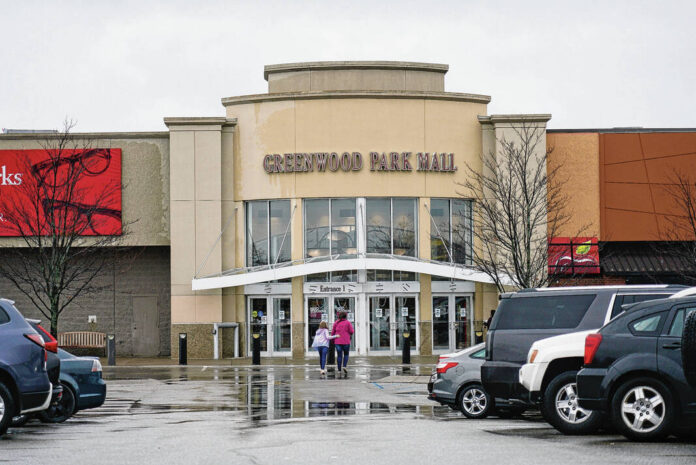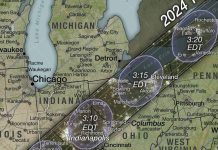By The Indianapolis Business Journal
INDIANAPOLIS — Security and real estate experts say the July 17 mass shooting at Greenwood Park Mall could have a chilling effect on shopping center activity around Indianapolis in the near future. But, they say, it could also spur questions about whether more measures are necessary to prevent similar events at malls in central Indiana and beyond.
The shooting, which took place around 6 p.m., left four dead—including the gunman—and two injured. It followed several other gun-related incidents at the mall over the past year, including two accidental shootings and a pair of armed robberies.
But despite those incidents, security expert Peter Beering said shopping centers are no less safe than other facilities in the United States that are open to the public.
“I don’t think that shopping malls are any bigger or lesser targets than anyplace else,” he said. “If you look across the annals of central Indiana history … a lot of bad things have happened at a lot of venues.”
Beering said malls have adopted extensive safety measures over the years to try to prevent mass casualty events, and to respond effectively to them when they occur. Most follow guidelines set forth by the International Council of Shopping Centers—which Beering helped develop through his firm Beering Enterprises Inc., which consults on security, terrorism and emergency-preparedness matters.
Greenwood Park Mall owner Simon Property Group, based in Indianapolis, said in February it would implement additional security following the two robberies. As part of those efforts, the Indianapolis-based property manager recently installed license plate readers in the mall’s parking lot. The facility also conducts drills on a regular basis and has police and security patrols at all times.
“Simon in particular is one of the most sophisticated and experienced mall operators,” said Beering. “They have a pretty good feel for everything that’s happening at their facilities—they know who belongs and they know who doesn’t belong. My experience, having worked with them, is that they get it. They will have a a specific targeted response for this.”
As far as additional measures—such as metal detectors or police dogs—are concerned, it’s likely to require extensive study and consideration, he said. And adding new security measures could be an expensive endeavor that could make people less inclined to go to the facilities, particularly as brick-and-mortar retail continues to struggle.
“The challenge is that the overall objective in the retail environment is to make it inviting and easy for people to come in and shop,” he said. “That’s not necessarily congruent with having a an airport-style checkpoint at every door. We’ve come to accept that if you’re going to go to a basketball or football game, you’re going to pass through screenings and have your bags inspected. It’s not impossible, but it’s harder to do at malls.”
At least one prominent shopping area in Las Vegas has adopted metal detectors and bag checks for weekend crowds, following a spate of violent crime nearby. The Fremont Street Experience requires all visitors to be checked for weapons before entry. The measures went into effect this month and have been met with some resistance.
Casino.org, a website dedicated to news from the gaming industry, reported Sunday that some visitors and local employees complained over the weekend that the enhanced security measures have jammed pedestrian traffic in the area.
“Detectors shouldn’t discourage passers through (those not going to a casino), as it cuts down on potential kiosk businesses,” Adam Phynes, a business owner in Las Vegas, said on Twitter.
Doug McCoy, director of the center for real estate studies at Indiana University, said implementing additional security can be expensive and time-consuming, likely deterring property owners from making such sizable investments.
Additionally, added security would require constant scrutiny and attention.
“It all depends on how well utilized they are and how well-equipped,” he said. “If you have people easily passing through—someone not really checking—it just doesn’t work. Without really good supervision, it isn’t enough. It would need to be an overall coordinated effort that gives people confidence in what it is and why it works—it can’t just be a metal detector itself, if they’re trying to do more to keep people safe.”
Already, Simon Property Group has a blanket “Code of Conduct” policy that says no weapons are allowed at its properties. But security personnel don’t check for weapons upon entry. Additionally, the active shooter was stopped by another individual who was lawfully carrying his own weapon at the time. And a statement issued Monday morning by Greenwood Park Mall praised the man who stopped the assault.
McCoy said all malls should constantly evaluate their safety plans and security measures to ensure their property is prepared for a situation similar to what occurred in Greenwood.
But, for now, he said, the shooting could have a chilling effect on would-be shoppers to central Indiana malls.
“It’s definitely going to affect people in the short run—our memories are short on this sort of thing,” McCoy said. “If we start having fewer shootings, then this may wear off. On the other hand, if these mass shootings continue or even escalate … it’s going to change behaviors.”





